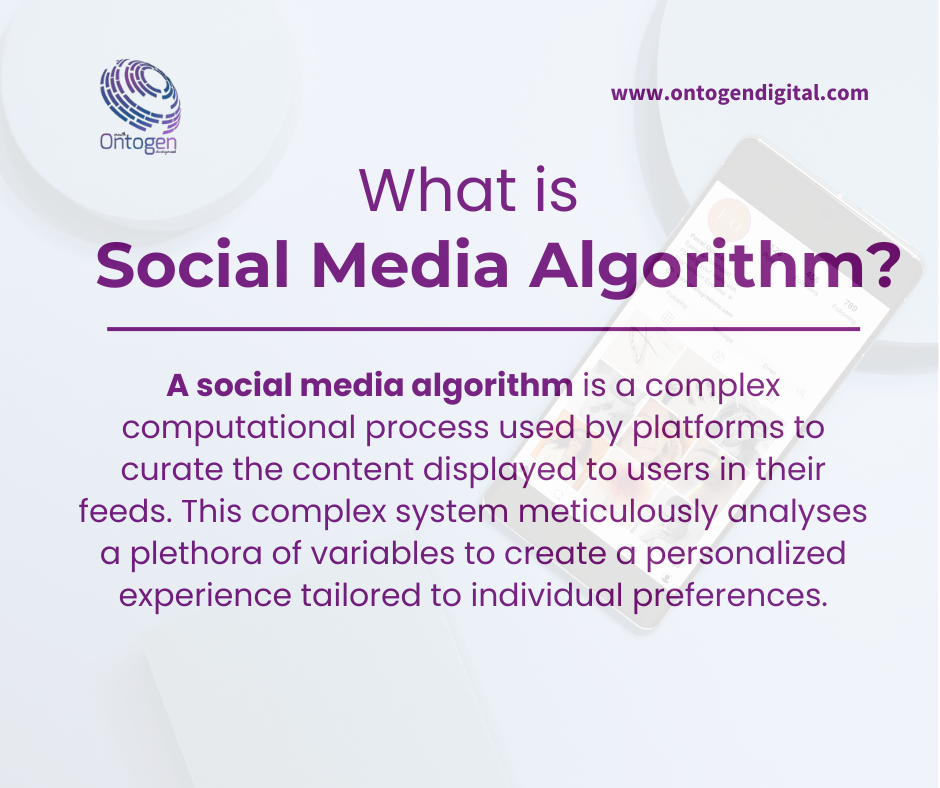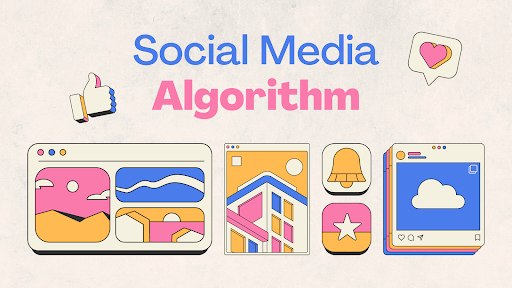23 July 2024 |
By - Sudha Mariappan

Ever wondered why some posts always pop up at the top of your Instagram or Facebook feed?
It’s almost like these apps know what your wants and needs are.
While you’re scrolling through one type of post you like, the app recommends more of those posts.
This is how a social media algorithm works.
What is a Social Media Algorithm?

Think of social media platforms as crowded marketplaces.
You’ll imagine as many products, which are posts, and a lot of customers, or users.
You would need to separate the customer base according to their wants and needs.
Similarly, algorithms become a set of rules and regulations that govern the app’s operations. Its basic task is to filter out the content you see, rank them on the basis of your priority, and recommend similar posts. This digital tool will be the one to decide what posts you will see and where in the feed the posts may appear.
The algorithm learns what you like and dislike through your likes, comments, shares, and time spent on different kinds of content. It gets better at predicting what you might be interested in over time.
How Algorithms Work?
Understanding an social media algorithm might be complex, but the basic steps are included as follows.
- The algorithm gathers information about your interests, behavior, and accounts followed. It will likely be watching on Instagram the content you engage with, the kind of hashtags you use, and where you are located.
- Then it assesses every post against your profile for relevance. It does this through keywords, pictures, and other elements that identify what your interests are.
- All of the posts will be scored by the algorithm, which first bases them on relevance and several other factors. Posts more related to your interests usually light up with engagement and generate higher scores.
- Posts having higher scores are likely to go up to the top of your feed. Though algorithms do keep learning and changing, time changes this order.
It's key to know that various platforms have their algorithms. For example, Instagram's algorithm is built around visual content. In a similar fashion, YouTube looks at watch time.
Why Understanding Algorithms Matters?
Understanding the inner workings of algorithms is not only pertinent to any social media user but more so to businesses.
Higher Visibility: Knowing the algorithm means that you will be writing content that is most likely to reach the target audience. For example, relevant hashtags on a company post to Instagram will make their way into search results.
Better Engagement: In case your audience actually resonates with your material, that will hike the likes, shares, and comments. The increased engagement shows the algorithm that this is quality content so it gives you more visibility.
Effective Ads: Algorithms help in targeting the right people with your ads, making the ad spend more effective. Knowing how the algorithm works helps one create ads that convert better.
Consumer Awareness: Knowing how algorithms are driving the content you are seeing helps make one a more aware consumer. It also helps in noticing probable bias, which means if the customer is particularly interested in one product or filter bubbles.
Read Also: 10 benefits of having a strong social media presence for your business
How Algorithm lets Content Get Ranked:
While certain factors may differ from one platform to another, there are some general principles behind their operation. Something as simple as relevance means that content directly relevant to you is more likely to come up.
For example, if you have a number of fitness accounts that you follow, then it is more likely that you will see fitness-related content.
You must have noticed how well engaged Twitter's X app is now. New posts often get priority for many platforms. At the same time, evergreen content could be that which remains relevant over time. One such popular example of evergreen content is “ Ultimate Guide” for fashion or any other niche your customer is looking for.
This includes an increase in posts with a lot of likes, comments, and shares. This means that either the content is relevant to users or it has some value for them.
Also, the posts of accounts you follow or popular accounts have orders in rank. That is why developing a quality following matters. If your fan following is decent, your content might rank better than your counterparts.
Attention-grabbing images and videos may easily attract a user's eye. That is why visual content is maximized on platforms like Instagram and Pinterest.

Finally, weight is assigned to each criterion. It changes from platform to platform and even on every form of activity one does at any point in time. Besides, algorithms are never stable, so something that works today may not work tomorrow.
Key Elements that Impact your Content's Visibility:
The following might impact the performance of your content.
- Hashtags: These are things one uses to help your content gain maximum visibility. For example, hashtags such as #explorepage will take you to the explore page of the app. When you use irrelevant or excess hashtags, it will hurt your visibility.
- Timing of a post: A post made at the right time could increase its visibility. Not all platforms have the same times of peak engagement.
- Type of content: Different formats for various content, such as images, videos, and text, result in different outcomes. For example, video content goes well and has better performance on TikTok and YouTube.
- Algorithm rules: Every platform has its modality. For example, Instagram gives preference to Stories and Reels. On the other hand, LinkedIn is oriented to long-form posts.
- Paid Ads: These aren't actually part of the algorithm per se, but they're an integral part in helping your content's visibility.
Read Also: What are Paid Ads? How do paid ads drive conversions in digital marketing?
How User Engagement Impacts the Algorithm:

Engagement acts as fuel to the algorithm. Every time the users engage with your content, it signals to the platform that your post has value. More likes, more comments, more shares, and saves make it more probable that your content will be seen by other users.
Not all forms of engagement are created equal. For example, comments are always much more valuable than likes because they reflect a deeper level of engagement.
It is important to build a real community with your content and not be involved with some cheap tactics for engagement bait or clickbait. It might endanger your reputation and algorithm ranking.
Knowing how algorithms work enables creating content that speaks well with audiences. In this way, keeping up-to-date on the changes in algorithms and testing new opportunities is the key to more visibility and achievement of goals on social media.
How your content will align the social media algorithms:
Now that you know how the basic aspects of social media algorithms go about, let's dive in to see exactly how you can leverage this information to create stand-out content.
Knowing Your Audience:
The creation of great content begins with knowledge of who your target audience really is. Who are you trying to reach? What are they like? What are their tastes, preferences, and behaviors? Having deep familiarity with an audience is very effective at customizing the content for them, relevance, and great chances of its being viewed or shared.
All you need to do is extract valuable audience insight through Analytics: demographic, interest, and on-web behavior information. This will be at the core of generating content that speaks out to your audience, serving their needs and desires.
Content Discovery:
To make your audience discover your content, you need to make sure that maximum numbers of audiences view or consume your content. The optimization techniques in this phase ensure that your content will achieve wide visibility across your target audiences.
- Finding keywords and phrases relevant to your niche that your target audience is searching for is greatly helpful for better engagement with your audience. Naturally integrate these keywords into your content.
- Think of compelling captions and descriptions representative of your content and rich with keywords.
- Ensure that your visuals are of good quality and have a view that will be visually captivating.
- Add relevant hashtags that will make sure you reach maximum discoverability of your content, but refrain from overusing them as this is considered counterproductive.
Each platform has its own algorithm and best practices. Optimizing your content accordingly will help your posts come forward. For example, instagram’s algorithm is based on user-relationships, their interests and timeliness. Twitter on the other hand uses recency and relevancy for their posts.
Read Also: Basics of Pay-Per-Click advertising: How to Create and Design your Ad for your business.
Testing and Adapting Your Strategy:
As the world of social media is constantly moving, so should your content strategy. By experimenting with forms of content, posting times, and methods of engagement to find out what works for you will help improve your social media algorithms.
Track the performance metrics to learn what's working and what is not. Take the help of data to improvise in your strategy by data-driven decisions.
How to Stay With the Algorithm changes?
The algorithms of social media are always on the move. It is likely to be updated on the trends and best practices.
Staying on Top of Algorithm Changes:
Stay ahead of algorithm changes through industry news and directly by the social media platforms. Be aware of how these changes will affect your content and hence strategize accordingly.
Most social media platforms give insights and resources for creators that help in keeping up-to-date. Use those for making sure you have the latest information on algorithmic changes and best practices.
Develop a Strong, Engaged Community:
This means developing a healthy and engaged community, which is critical for long-term success. That includes engaging with your audience through comments, messages, and questions and ensuring that one reacts fast.
Design user-generated content through contests or challenges. Collaborate with other content creators in the niche to engage with a new audience and build reach.
Leveraging Data and Analytics:
Data is your best friend where social media marketing is concerned. Therefore, utilize tracking tools from social media to see and understand your audience.
Identify what key metrics would most relate to your business goals, such as reach, engagement, conversions, or even ROI. Use this data to measure campaign success and drive data-informed decisions.
Build a strong social media presence to hit the nail on the head. Understanding the algorithms of social media, developing compelling content, and staying up-to-date with the trends could be the way.
Keep in mind that consistency is the key.
So you need to start experimenting, learning, and adapting strategy to stay ahead of the competition.
Conclusion:
Knowledge and effective use of social media algorithms are no longer options, they are now a requirement for any business or person. You will be better placed at developing content that resonates with your audience to build a strong community with meaningful results if you know how these algorithms work. The digital landscape is in a constant flux, so learning continuously to stay on top is what will make your business relevant.
KEY TAKEAWAYS:
- Social media algorithms determine what content users see.
- Understanding your target audience is crucial for content creation.
- Optimizing content for discoverability is essential for visibility.
- Building a strong community and engaging with your audience are vital.
- Continuous learning and adaptation are key to success in the ever-changing digital landscape.